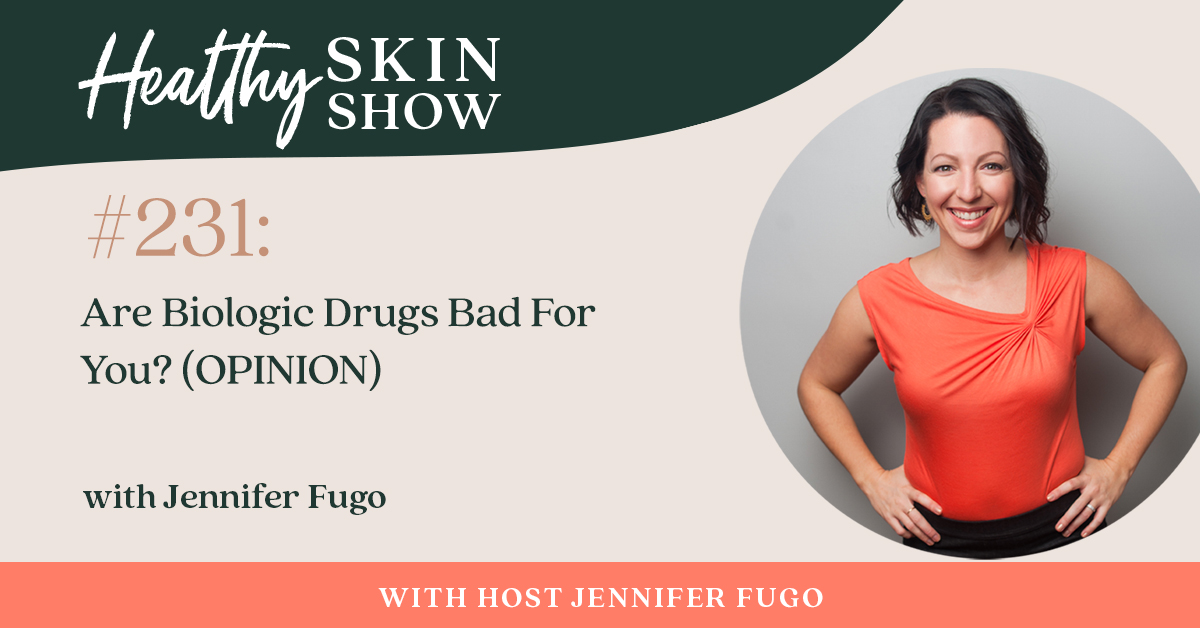
This episode is bought to you by Quell — to help support rebuilding healthy skin from the outside-in + inside-out!
Take 10% off your next order! Use promo code QUELL10 at check out — Get started HERE!
– – –
Have you ever wondered if biologic drugs are bad for you?
It’s a question that I frequently answer on my Instagram profile, but I also find that clients share similar concerns.
So I figured that I’d take this moment to explain my feelings on biologic drugs which is not a black + white answer.
It is complicated and it’s also highly personal for every single person considering this route.
I hope that my approach is helpful on your journey so that you can ultimately decide what is best for you.
Or, listen on your favorite app: iTunes (Apple Podcasts) | Spotify | Stitcher | TuneIn | Subscribe on Android
In this episode:
- My non-medical practitioner opinion about whether biologic drugs are bad for you
- My personal belief system about informed consent (and where it came from)
A simple analogy to understand how biologic drugs work
- Do biologic drugs cure your condition?
- Suggested steps before agreeing to a biologic (or any other type of serious medication)
- Can you still do root cause work if you’re taking a biologic?
Quotes:
There’s too much shaming and fear-mongering that can make it difficult for you to advocate for and trust in the decisions that you make.
My opinion about how using or not using medication was instilled in me by my father who was a very staunch advocate for informed consent.

Are Biologic Drugs Bad For You? (OPINION) (FULL TRANSCRIPT)
Welcome back to episode #231 of the Healthy Skin Show!
Today’s episode is a brief answer to a question I’m often asked about the use of biologic medications for chronic skin conditions.
Basically, are biologic medications bad for you?
Now, some might argue that I have no business discussing this since my scope of practice doesn’t allow for me to prescribe medication.
And I did honestly consider who I could have come on the show to answer this question, but then I realized that you’re still going to ask for my non-medical practitioner opinion anyway.
So this episode is based on my understanding of how the medications work AND what I’ve seen in my private practice clients.
My opinion is something to consider, but ultimately your decision whether to use or not use a certain medication is between you and your doctor after you have an informed discussion with them about the pros and cons of a specific medicine.
Ultimately my goal here is to provide perspective – not to tell you what to do.
Nor to shame you to use or not use a specific medication.
The choice is and always will be yours.

Where I’m Coming From First…
Before sharing my opinion on this topic, context is important –
My dad was an ophthalmic surgeon (being both an MD as well as a PhD) and we had a small, but very busy private family-owned practice which we closed at the end of 2019 because of my father’s declining health.
I worked for my dad while growing up as well as after college – helping him directly with patients in the exam room as well as overseeing his staff and handling medical billing for the practice. This was my life before starting my own practice and growing it to where it is now.
So my opinion about whether to take or not take medication is something that was instilled in me for years by my father who was a very staunch advocate for informed consent.
It didn’t matter what drug or procedure was being considered for himself or me or anyone else in our family – you should understand the pros and cons of procedure or medication and have a conversation about it with your physician to help you make the best choice for yourself.
I’ve taken that piece to heart and often hold space for clients who are trying to decide what’s best for themselves.
I don’t believe that your choices should be based on appeasing someone else or bowing to pressure placed on you by others.
Feeling bullied or pressured by anyone around medication that you choose to take is fundamentally wrong in my book.
Assuming you have the ability to speak for yourself as an adult – you have the right and responsibility to decide what’s best for you.

What Do Biologic Drugs Do?
Since I’m not a doctor, I’m going to explain biologic drugs in more layman’s terms so that hopefully you won’t feel overwhelmed.
It’s really easy when you start encountering these medications to have concern or feel fear… they are serious medications.
They should be treated with respect for the work that they do in the human body and thus deserve careful consideration.
Biologic drugs for chronic skin issues (like eczema and psoriasis) work by blocking or interfering with specific parts of biochemical pathways involved in inflammation.
Different biologic meds deal with different cytokines or parts of your immune system – they’re not all the same.
The action stops the specific symptoms driven by this inflammatory response so that your experience of the disease is lessened or disappears.
Let’s unpack this for a moment and relate this to a car…
My car has been having a number of issues since it’s older and a few days ago the “Check Engine” light came on.
Clearly there is something going wrong with the car, but until my mechanic connects his device to the car’s computer to read the exact error codes, we won’t know what’s wrong.
So the “Check Engine” light is important because it’s telling me that something is wrong, but it’s not specific.
My point is that your symptoms are like the “Check Engine” light, but they may not be specific enough to direct you to exact root causes.
And a biologic drug will essentially shut off the “Check Engine” light.
Biologic drugs do not “cure or heal” root causes. If they did, you’d be able to go off of them without the symptoms returning.
They are a management tool that can greatly improve quality of life, pain levels and other factors.
But they also come with potential side effects that you should educate yourself on so you can ask the right questions or know when something isn’t right if you take the medication so that you can discuss the issue with your doctor.
Some of those side effects are due to the modulation of your immune response which is why many (but not all) biologic meds for skin issues can increase your risk of fungal overgrowth.
While others like JAK inhibitors are required to have a black box warning from the FDA due to “...an increased risk of serious heart-related events such as heart attack or stroke, cancer, blood clots, and death with the medicines.” (1)
One of the side effects I covered recently on the Healthy Skin Show is called Dupilamab Facial Redness. It impacts about 10% of people using Dupixent, but was not listed in any of the clinical trial data submitted to the FDA.
I share this not to scare you, but to offer you the reasons why it’s important to go into the decision with your eyes wide open.
I do think there are factors to consider before you go on a biologic which I’ve actually discussed in Episode 137 of the Healthy Skin Show, so check that out as part of your process.

Are Biologic Drugs Bad For You?
So with that all said – if you’re wondering if biologic medications are bad, then I invite you to consider the following…
Medications (including biologic drugs) definitely serve a time and place.
Especially if you are truly suffering. (It’s not like you win a prize for how much suffering you can endure.)
It’s okay to essentially “tap out” for a while to improve your quality of life.
Parents often share with me that they need some relief so that they can be present for their family and kids.
Or to be able to support your family by being well enough to go to work.
Or even to improve your sleep, shift your mood and help your mental health, be in less pain and even to just not have to think about your rashes every waking moment…
The reasons are many and each is valid.
Some people will choose to use biologics and go about their merry way, while others want an endpoint ahead where they want to get off of the meds which involves the root cause work I talk about here on the Healthy Skin Show.
Either way is fine – again, this is not my journey.
You get to decide if taking a biologic to mask the symptoms for a period of time or forever is in line with your health values.
And just for the record, you can absolutely work on root causes while on biologics. In my private clinic, we support many individuals on biologics with the goal to transition off of the medication without a severe rebound of their skin rashes + other associated complaints.
So all is not lost.
You don’t lose out on doing the deeper root cause work just because you are on a biologic or you’re thinking about going on one.
Just make sure that you don’t rush into the decision.
Ask questions.
Read up on the potential side effects.
Ask more questions.
Consider your state of mind, your level of suffering, and your quality of life.
Factor in your overall health as well as how motivated you are to make changes.
And set goals if it seems appropriate for you based on your own health values about the road ahead.
Whatever you choose is the best decision for you.
There’s too much shaming and fear-mongering that can make it difficult for many of us to advocate best for ourselves and trust in the decisions that we make.
So I hope my opinion at least helps you hold space for your own sense of agency and allows you the room to consider and advocate for yourself without fear or judgment.
It’s your journey and I truly believe that only you know what’s best for you.
If you’ve got any questions or thoughts to share about this, leave a comment below so I can address them.
Take a moment to share this episode with someone you know who is facing this decision about whether to use a biologic or not so they can decide what’s best for them.
Thank you so much for tuning in and I look forward to seeing you in the next episode!

REFERENCES

Jennifer Fugo, MS, CNS
Jennifer Fugo, MS, CNS is an integrative Clinical Nutritionist and the founder of Skinterrupt. She works with women who are fed up with chronic gut and skin rash issues discover the root causes and create a plan to get them back to a fuller, richer life.





